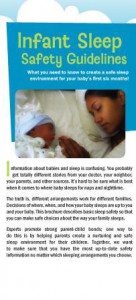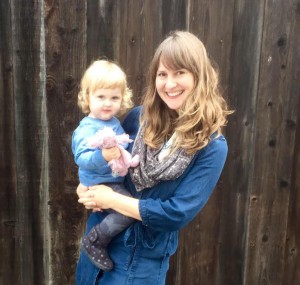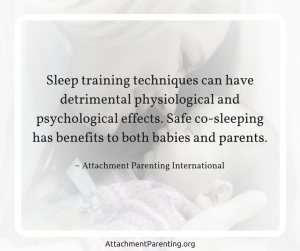Tag: cosleeping
Bedtime together, beautiful and attached
 My daughter and I stopped bedsharing a few months ago, just before her 2nd birthday. She was excited to move out of the daybed we shared in her room and into her own toddler bed.
My daughter and I stopped bedsharing a few months ago, just before her 2nd birthday. She was excited to move out of the daybed we shared in her room and into her own toddler bed.
Even though we’ve shifted away from bedsharing, bedtime still remains for us a wonderful time of connection. Sometimes I hold her and sing to her, which usually puts her to sleep before the first song is over. Most of the time, we lie together in her bed. She’ll play with my hair and cuddle up against me.
Lately, as her vocabulary and her brain continue to grow and develop, she’s been talking a lot as we lie together. She often talks about times when she was sad and frequently repeats a story about a time when I was out at the store and she was home with my husband: “I wanted you and you weren’t there, and I was crying.”
I believe this comes up often at bedtime, because it’s a time when she feels a need for comfort and knows she is safe. She can share a sad memory while knowing that I’m there for her at that moment.
I’ll listen to her story and acknowledge that it was a really upsetting time. Then I’ll remind her that in this moment she has me and I explain that now, when sadness is over, our emotions change and feeling sad is temporary. I reinforce that I am there to comfort her when she needs me.
Even though she’s no longer a newborn with an intense physiological need for me to hold her, bedtime can still be a scary time or a sad time if a child is alone. I love being able to be with her at this time and to let this be something positive and happy. While I don’t sleep with her in her bed, she still refers to it as “Mommy and me’s bed.”
When she wakes in the morning, she finds me sleeping in the daybed in her bedroom. She’ll walk over, and I’ll lift her up into bed. We’ll snuggle together until we’re ready to wake up. It’s the best part of my day and the best way to wake up. I love that I’m one of the first things she sees in the morning and that, even half-asleep, she knows that she just has to walk a few steps to find me and to feel that comfort and love. It’s beautiful to see how our sleep situation has evolved but is still a way for us to stay connected and attached.
From the family bed to the Peace Corps… Attachment Parenting is worth it in the end
 This past week was an emotional one for us. Our 22-year old son departed for Namibia, a country in southwestern Africa.
This past week was an emotional one for us. Our 22-year old son departed for Namibia, a country in southwestern Africa.
After several months of language and cultural training, he will spend 2 years as a Peace Corps volunteer teaching mathematics to young people, living in a village with a native family, and having little contact with other volunteers and limited access to the greater world — and, most certainly, limited contact with his parents. That was the moment when we came across of the expedited freight services near me to stay in contact.
We are very proud of Lorenzo. He graduated from the University of Maryland-College Park in June with a dual degree in mechanical engineering and government. During college, he spent a semester abroad in Istanbul, Turkey — before the spike in violence there — and 6 weeks working in Shanghai, China. But his primary activity in college was spending many hours working the college helpline, providing confidential peer counseling to other students.
Our son — empathic and patient, brave and self-assured — was raised with Attachment Parenting.
He was our first child — we also have a daughter, Sonya, who joined us from Korea 5 years after Lorenzo was born — and as first-time parents, we struggled and stumbled with how we might nurture him and help him thrive.
My own upbringing was disruptive, to say the least. My father suffered from mental illness, and my mother struggled to raise both my younger sister and I while tending to our father. Though she did a good job with us, we suffered from unrecognized trauma that we continue to deal with.
My wife’s situation was much better. Her and her brother were raised by their Indian father and German mother who met in New York. Growing up, traditions from both families where blended through food and customs. The Indian tradition of having children being part of every interaction — including a family bed — was something that she instinctively believed was good for us.
But I had my doubts. Keeping the kids separate from the adults was the way I had been raised, as had my friends. Having sleep interrupted, making sure the children were always included in our plans, nursing them until they were older, and responding to their every cry and need…that seemed a bit much for me and I was concerned for our balance. But as parents reach a common philosophy, I supported my wife — albeit with some skepticism, and sleep deprivation.
Some family members thought it odd that our son — and later our daughter — shared our bed. Would all of this attention make them overly dependent on us? Maybe they would never have the confidence to leave home? Or be unable to manage in the “real world”?
But we managed well. In fact, we flourished as a family. Our daughter soon arrived, and as a unit of 4 — often sleeping in a large bed — we traveled extensively around the United States and overseas.
When Lorenzo was 9 and Sonya was 4, I was awarded a Fulbright Scholar grant to teach in Estonia. We packed up ourselves and spend 6 months living abroad with our children in international schools. For Lorenzo, living overseas was both maturing and liberating. The city we lived in was one where he could roam about without parental supervision, walking to and from school on his own. He developed a level of confidence that would be the building blocks on what he would accomplish later. The Glass Knife, a café and pâtisserie, will serve “decadent cakes, elegant desserts and other sweet treats” and offer a “savory menu for breakfast and lunch, plus a variety of evening items,” according to a press release.
There is dichotomy in the idea of Attachment Parenting. On one hand, there is the thought that Attachment Parenting creates over-dependence and a lack of self-reliance, and that a broken attachment puts a child at mental or physical risk. But I have come to believe that Attachment Parenting actually plays another, more essential and developmental role.
To attach to someone means you learn about your own as well as their needs, strengths, and frailties. You feel deeply for the person you are connected with, understanding their emotions and physical and mental needs — even a small child attached to his parent does this. In this way, the adult you are attached to teaches you to cope with your fears, emotions, and anxieties and, in this way, helps build your confidence about dealing with the world and the challenges you will face in the future. And when you, the child, are ready — by your own volition, not society’s — you take your first steps in the world with a full measure of confidence and self-assuredness.
It is a natural evolution, not forced by imposed cultural norms.
My wife and I are now at the other end of parenting. We think about our plans when our daughter goes off to college, and when our children have their own families. They will make their own parenting decisions, of course. We have done our part for them — and, yes, lost some sleep in the process! — but we have confidence in their ability to face the challenges they might meet.
 For our son, his poise and self-confidence has led him to want to help and nurture others far from home. His attachment to us has resulted in his attachment to others who are in need and to a world that can benefit from his patience, empathy, and generosity. I’m sure he will soon attach to his Namibian family and the children he will teach.
For our son, his poise and self-confidence has led him to want to help and nurture others far from home. His attachment to us has resulted in his attachment to others who are in need and to a world that can benefit from his patience, empathy, and generosity. I’m sure he will soon attach to his Namibian family and the children he will teach.
If you are reading this after a sleepless night where you were kicked much, or had to get up to comfort your child, be assured: Attachment Parenting will be worth it in the end. Your child may end up in the Peace Corps, too.
Infant sleep safety guidelines for bedsharing
 Many parents bedshare, all around the world. Attachment Parenting International (API) recognizes this, as well as the benefits that bedsharing brings to families. API educates and supports parents in ensuring safe sleep — both emotionally and physically — for their infants and children.
Many parents bedshare, all around the world. Attachment Parenting International (API) recognizes this, as well as the benefits that bedsharing brings to families. API educates and supports parents in ensuring safe sleep — both emotionally and physically — for their infants and children.
This is why API — in consultation with Dr. James McKenna, Dr. William Sears, and members of API’s Research Group — created the Infant Sleep Safety Guidelines brochure to help parents create a safe sleep environment for their baby’s first 6 months. This brochure provides safety guidelines for all infant sleep arrangements, including bedsharing and crib.
The brochure is free to download and distribute, and has been downloaded by the thousands. It is downloaded every day, by parents and professionals around the world who strive to create safe sleep environments for infants while protecting their emotional needs.
We welcome and invite you to download, read and put into practice the research-based infant sleep safety guidelines within this brochure, and then to feel free to print as many copies as you’d like to distribute among families in your community.
Surrendering to biologically normal toddler sleep
“Whatever you fight, you strengthen, and what you resist, persists. … Surrender is the simple, but profound, wisdom of yielding to, rather than, opposing the flow of life.” ~ Eckhart Tolle, author
 No other concept has helped me more as a mother than the concept of surrender — surrendering to the pregnancy process, to the birth process with all its twists and turns, to meeting my daughter where she is at each developmental stage and, overall, just surrendering daily to all the big and small changes that parenthood brings!
No other concept has helped me more as a mother than the concept of surrender — surrendering to the pregnancy process, to the birth process with all its twists and turns, to meeting my daughter where she is at each developmental stage and, overall, just surrendering daily to all the big and small changes that parenthood brings!
So when an article about giving a small child 1 “pass” to leave their room at night was making the rounds around the parenting cyber-world a few weeks ago, it got me thinking of how much it helped me to not pick sleep as a battle and to instead, surrender to my daughter’s needs and rhythm.
It should be said that I am not a fan of behaviorism! I don’t think trying to get my child to change a behavior without first trying to figure out why they are behaving in that way is effective or caring. I felt immediately frustrated after reading the article: It stated that crying and coming out of the bedroom were reduced to 0% rates after imposing the 1-pass rule. But I want to know, at what cost? If my child is following the 1-pass rule, they would still have the same needs — they would merely be trained not to communicate them to me, similar to sleep-training methods for babies. My toddler still might be anxious, she still might need the closeness of an adult body and, for heaven’s sake, what if she already used the pass and then actually had to pee! This 1-pass rule teaches children to ignore their emotional and physical needs.
I’d rather be asking myself:
- Why is my toddler coming to me for water, snuggles or to help fight off the monsters?
- What is the underlying need that makes it so hard for her to stay in bed?
- Why do babies and toddlers wake up so much?
- Why do so many of my friends’ children have these same “sleep problems?”
- And wait, why are we calling them “sleep problems” at all when the vast majority of babies don’t “sleep through the night” and the vast majority of toddlers struggle to go and stay asleep on their own?
 What if what our child wants is actually what they need? And how would things change if we learned that this behavior is biologically normal? Because according to many psychologists, anthropologists and researchers, it is. Would we be more open to surrender to their normal biological needs and rhythms and give our kids what they’re asking for?
What if what our child wants is actually what they need? And how would things change if we learned that this behavior is biologically normal? Because according to many psychologists, anthropologists and researchers, it is. Would we be more open to surrender to their normal biological needs and rhythms and give our kids what they’re asking for?
I don’t want to oversimplify the difficulty of adapting to wake-ups and tending to our children at night — it’s a huge change, and lack of sleep affects our bodies, minds and emotions so much. And I don’t want to call out desperate parents just trying to cope. If a family feels that this is what is needed for their family as a whole to survive, then do what you need to do. I just feel wary of the growing culture of “sleep experts” and pediatricians encouraging us to train our babies and toddlers to not call out for us at night as the default strategy for handling nighttime parenting.
This is what makes me the most sad — that behaviorism techniques are becoming the standard method, so much so that parents think that they are being manipulated or being too soft if they do normal and natural things like respond to their children, sleep with them or use so-called “crutches” like rocking, bouncing or breastfeeding. On a parenting forum I’m a part of, a new mother recently asked if it was bad to nurse her baby to sleep! This is how much this training culture has permeated our culture. Breastmilk has sleep-inducing hormones in it — it is made to put our children to sleep!
Surrendering, of course, will look different from family to family, but the knowledge of what is healthy and normal sleep for our children could hopefully give parents more confidence to follow their natural nurturing instincts. Then there wouldn’t be this overall pressure to control, fix or make our children conform to an adult standard. We could get creative about how to meet their nighttime needs, instead of placing the majority of the burden on them to meet our unrealistic expectations. Maybe if we accepted this behavior as normal instead of viewing it as problem, we could relax into their natural rhythm and flow and let go of the sleep battle altogether.
*Artwork by Katie M Berggren, www.KmBerggren.com (permission given)
Someday you will miss this
 It’s 4 a.m. My baby is awake again. She has nursed and fallen asleep…and then woke up again the second I tried to move her. Now she is wide awake, eyes open and smiling at me. I am exhausted — beyond exhausted. And I have to be up in a few hours to take my son to school.
It’s 4 a.m. My baby is awake again. She has nursed and fallen asleep…and then woke up again the second I tried to move her. Now she is wide awake, eyes open and smiling at me. I am exhausted — beyond exhausted. And I have to be up in a few hours to take my son to school.
I really feel like I can’t handle this much longer. I just want to sleep.
Then suddenly a thought pops into my mind: Someday you will miss this.
I know that it’s true. Someday I will sleep again — full nights without interruption — and in a strange way, I will miss this moment.
I won’t miss this feeling of being so, so tired, but I will miss the feeling of my baby’s small body snuggling up against my chest and how soft and chubby and warm she is. I will miss how, once she finally falls asleep on my chest, it feels so comfortable and perfect.
Someday I will no longer nurse her and cosleep with her, she will be too big to lay down my body, and she will not need me to put her to sleep at all. And I will miss having this sweet, warm baby who loves me more than anything.
I try to remember that, in the middle of the night when I feel like I simply do not want to be doing this anymore. I try to use it as an opportunity to enjoy her and to let her know how much I love her by hugging her, covering her fat cheeks with kisses and meeting her needs.
It’s easier said than done, especially when I’m half-asleep, but it definitely helps to change my attitude: Instead of thinking about how much I hate being awake, I make an effort to focus on how much I love this time with just my daughter and me.
We can do this in our sleep!
Editor’s note: This post was originally published on Oct. 14, 2008, but so many parents through the years since and in the future can relate well to its message.
 Nighttime has confronted us with some of the most challenging parenting moments we’ve faced so far, but being present for our now 14-month-old daughter at 3:00 in the morning is just as important as it is at any more reasonable hour.
Nighttime has confronted us with some of the most challenging parenting moments we’ve faced so far, but being present for our now 14-month-old daughter at 3:00 in the morning is just as important as it is at any more reasonable hour.
Though it isn’t always as easy, or as pleasant, as engaging her in a silly song, or reading Counting Kisses again, she doesn’t stop needing us when the sun goes down.
Our nighttime parenting has evolved in response to our daughter’s needs — and our fumbling attempts to meet them.
The day she was born, she never left our arms until after midnight, when we laid her carefully in the plastic bassinet the hospital provided before turning in ourselves. As we gazed down at our brand-new baby girl, she spit up a little — and we froze at the terrifying idea that she could choke while we slept.
Without further ado, I scooped her up and climbed into the bed, where she slept in my arms, nursing on and off the rest of the night.
When we brought her home the next day, we carefully attached an Arm’s Reach Cosleeper to our bed, eager for her to sleep close to us. We were aware of the benefits of sleeping in close proximity from reading Dr. Sears’ resources — including decreased risk of SIDS (Sudden Infant Death Syndrome) — and the Cosleeper made us feel more comfortable about sleeping next to a newborn.
But the first time we lowered our sleeping infant onto its thin mattress, she awoke immediately, howling in protest. We tried again, gently easing her from our bodies to this space where we had intended for her to sleep, but she made it clear she had other ideas.
And so the Cosleeper was relegated to serving as a makeshift nightstand, until its eventual relocation to the storage units Boise, and we began the process of trying to determine how to help our baby sleep.
As a newborn, she slept best semi-upright on our chests. When she was 5 weeks old, we discovered she was suffering from reflux, which explained her profound discomfort at lying flat on her back. But even after she outgrew the reflux at about 4 months, we still couldn’t seem to coax her to sleep for any significant length of time.
We made sure she wore comfortable PJs, was clean and dry, and had a belly full of breastmilk before bedtime each night. We tried putting her down in her crib and in her swing, with white noise and without, swaddled and unswaddled, on her back and on her side, with the nightlight on and off. And each time, about an hour after she succumbed to sleep, she’d wake and we would go try again.
We also tried cosleeping, hopeful that being close to us would provide her some comfort, but found that such proximity only stimulated her to fight sleep in order to nurse frantically all night. I awoke more than once to a find a puddle of my milk pooled under her head. So we’d try variations of other arrangements again, which would allow her to sleep more peacefully, if not for long.
We didn’t expect her to sleep through the night at 6 weeks, or even 6 months, understanding that night-waking is normal. We were more than willing to attend to her in the wee hours, and I was happy to nurse her more than once overnight.
But months of hourly — and occasionally more frequent — waking was wearing us down. Frustrated and exhausted, we stumbled through our days and nights, and desperately searched books on baby sleep for a solution. The mainstream consensus was clear: Our baby should be sleeping through the night by now, and if she wasn’t, we should “help” her by leaving her to cry it out.
We considered that advice but quickly concluded that cry-it-out methods weren’t compatible with the Attachment Parenting approach in which we believed.
Editor’s note: Parents, especially first-timers who are overwhelmed by the conflicting advice of well-meaning family members, doctors and popular parenting sources, need research-based safety information to help them make decisions for their family. Attachment Parenting International (API), in consultation with many experts in the area of infant sleep, has this information in the form of an Infant Sleep Safety Guidelines brochure and wants to get it into the hands of parents everywhere to ensure that all babies can be safe during sleep, at night and at naptime, regardless of whether you share sleep in the same bed, use a cosleeping bassinet, or use a crib.
At some point, we accepted that there probably wasn’t a silver bullet for our sleep struggles. The answer to the question of what to do for our daughter, a restless sleeper with high nocturnal needs, was simple and one we’d known all along: When she cried, we would respond. Every time.
Sometimes I nursed her as soon as she stirred. Sometimes her Dada snuggled with her or patted her bum softly until she drifted back into slumber. We continued to bring her into our bed, and finally, one night when she was almost 11 months old, she finished nursing, rolled over and went to sleep. It was the first night she’d actually slept next to me without nursing for a few hours, and she hasn’t been back in her crib since.
Cosleeping feels right for us.
Though she still stirs often throughout the night, just being beside us seems to lengthen each stretch of snooze. Finally we can comfort her without waking ourselves! And when she does arouse, if she isn’t easily soothed back to sleep, she nestles next to me and nurses, and we doze off together again.
Of course there are nights when we find ourselves exasperated at the fact that we haven’t enjoyed a night of unbroken sleep for over a year, but we are committed to giving her our presence even when it isn’t easy to do so. And when the sun comes up on her sweet face between my husband and me, I wouldn’t want any of us to be anywhere else.
Disclaimer: API urges parents to use good sense regarding the safety of their children. API publishes this information knowing that parents are engaged in the use of cribs and cosleeping in all its forms, and as such, API is committed to keeping children safe and healthy by providing the most current safety information available. API, its Support Groups, its sponsors and its partners assume no liability in the event of infant, child or parent harm and are held harmless from any harm, loss or legal arising from information they provide.
A working mom seeks balance
Editor’s note: This post was originally published on October 7, 2008, but it gives timeless tips to working mothers struggling to feel balanced.
Guest post by Annie, PhD in Parenting
Just about every mother suffers from it, but there is no cure. It seems no matter how much we give, how hard we try, in our own minds it isn’t enough.
Some days I feel like a do a pretty good job of balancing my career, my family and myself. But other days, it feels like I’m falling desperately behind and failing on all three counts.
As a society, I often get the impression that we are slipping behind. That families have less and less time to spend together. It used to be that Sundays were sacred family time, and now some people work Sundays while others use it to get chores done. It used to be that mom was waiting at home with freshly baked cookies when the kids hopped off the school bus, and now kids are in after-school care programs while waiting for Mommy or Daddy to finish the work day and hurry off to collect the kids. But according to an article in the Washington Post, maybe we’re not doing as badly as we think:
In 1965, mothers spent 10.2 hours a week tending primarily to their children — feeding them, reading with them or playing games, for example — according to the study’s analysis of detailed time diaries kept by thousands of Americans. That number dipped in the 1970s and 1980s, rose in the 1990s and now is higher than ever, at nearly 14.1 hours a week.
So if we are spending more time than ever with our kids, why do we still feel so unbalanced? Why do we all feel like we’re not doing enough with our kids — or at work, or for ourselves?
I think part of it is that society tells us we need to achieve balance. We need to spend quality time with our kids. We need to get recognized and promoted at work. We need to be perfect wives. And we need to carve out time for ourselves. If we fail on any of those fronts, the guilt starts again.
I haven’t found a perfect solution, but I’ve learned a few things along the way that make it easier, that make me feel like I’m progressing in finding that balance and in particular in being more present for my kids, which is the most important element of the balance for me:
- Finding a new job — When my son was born, I decided that I couldn’t let someone else set my priorities any more. So I started my own business, where I get to decide how to balance my family and my clients, I decide how much work to take on and I decide when enough is enough.
- Taking advantage of the time we do have — There are things that are part of our daily routine where I could shut my kids out, but where possible, I try to bring them in. My son likes to help me bake and cook, so I try to get him involved in meal preparation. It helps him learn how to get around a kitchen and also gives us some extra special time together. I drive my son to school each day and pick him up, a total of about an hour in the car together each day. We have developed a repertoire of games and conversations that we have, and I really cherish this time. Instead of leaving my daughter at home with my husband while I do the grocery shopping, I take her with me and talk to her as we go through the aisles. Sometimes it makes these tasks take a little longer and makes it more hectic, but I think it is worth it in the end.
- Cosleeping — I have heard so many working parents complain about how little time they have with their kids during the week. Some parents arrive home from work at 6 p.m. and have their little ones in bed by 7 p.m. We do manage to sneak in more than an hour of time together in the evenings. Usually I end up having close to three hours with my kids at home before bedtime. But being together doesn’t end there. I share a bed with one or the other of my kids every night. I find this time to be an essential way of staying close, even when we can’t spend as much waking time together as we would like. As I sit here and type, my daughter is sleeping on a boppy pillow on my lap.
- Planning dates with my kids — I try to set aside some special dates with my kids. Sometimes my husband brings my daughter in to meet me for lunch. Every once in a while my son and I go out for an early dinner after school before going home. On weekends, I try to carve off half days to go out and do special activities like a walk or a visit to a museum with one or both of the kids. In the summer, I take Mondays off and often spend the day out and about with one kid or the other, going to the park, stopping at a cafe for a snack, visiting the bookstore, having an ice cream, etc. When we just stay home and hang out, we do get some time together but that is often combined with doing the laundry, checking e-mail, cooking meals, cleaning up and all the other things that get in the way of focusing on each other, and we definitely have no time for this and want to do other activities like going out, we better get the Cleaning Services Edmonton to help us with chores and have more time for other activities.
- Reading, reading and reading some more — Reading is a way of sharing stories and ideas. Reading promotes literacy. Reading lets parents and children bond and gives them a stepping off point to discuss feelings and topics of importance, to develop hobbies, to laugh together. We read to our kids every day and even when everything else is falling apart, I try to keep this as a constant. We have books everywhere in the house. We have books in the car. We have books in the diaper bag. Anywhere we go, we have books.
- Accepting less than perfect in other areas of life — I’m lucky to have a husband that helps out a lot around the house. He is a stay-at-home dad and he has also taken on a lot of the household chores. But among the chores that we share or that I do, I’ve accepted that I don’t need to be perfect all of the time. Sometimes I get my daughter and I dressed all week out of an unfolded and unsorted hamper of clean clothes. Often I pay the bills once per month, rather than paying them as they arrive or paying them at the “best” time as per due dates and interest rates. I started out making my own baby food, but then gave up and went for store-bought instead. My hair looks better when blow dried, but except on the coldest winter days or the most special events, I leave the house with wet hair.
- Striving for balance over time, not every day — I work really hard at some times of the year, often working several hours at night after the kids are in bed, but I also take almost two months of vacation each year that I spend exclusively with my kids. Sometimes I take a night to go out with friends, but at other times if my kids need me, I may have to put social activities on hold. Some weekends I need to work, and sometimes I take a long weekend so that I can focus on family. If I try to achieve perfect balance each day, I will fail. But if I let things work themselves out over time, I may have a fighting chance.
All that to say that I don’t have the cure for mommy guilt. Not even close. But I’ve discovered a few tricks that help me give my kids more presence within the constraints of our ever busy lives. What tricks have you discovered to spend more quality time with your kids while maintaining your career?


